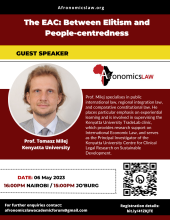Call for Papers by the Journal of Energy & Natural Resources Law: Energy Justice Framework - Perspectives, Reinterpretation and Implementation in Africa and the Global South
The Journal of Energy and Natural Resources Law invites contributions to a special issue on the Energy Justice Framework: Perspectives, Reinterpretation and Implementation in Africa and the Global South. We welcome submissions, particularly from Global South scholars, exploring the concept of energy justice and its framework from multiple situated contexts, together with strategic legal approaches toward its implementation in energy systems.

